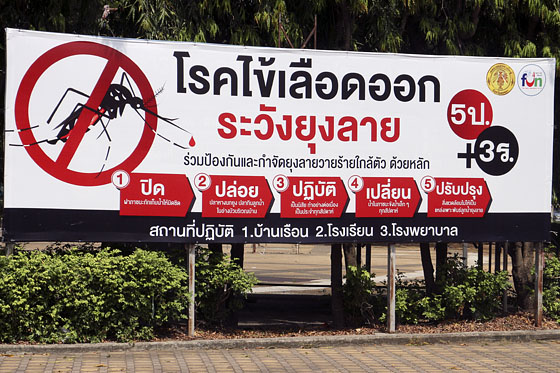Chikungunya | Symptoms, Treatment, Vaccines
What is Chikungunya?
During my first 15 years of living in Thailand I never heard anyone mention this disease. The first time was in 2018 when I heard that a young girl who lives in my neighborhood had contracted it. Apparently, it is now a problem in Songkhla province, where I live.
Chikungunya is yet another mosquito-borne virus carried, I believe, by the same mosquitoes that carry Dengue fever and the symptoms are very similar to Dengue fever.
What Are The Symptoms?
Chikungunya, like Dengue fever, causes flu-like systems including fever, headache, muscle and joint pain. It can also cause headache, nausea, fatigue and sufferers may develop a rash.
After infection, symptoms will begin to develop between 2-12 days, most commonly between 4-8 days.
How Is It Contracted?
It is contracted from the bite of infected female mosquitoes. Chikungunya is transmitted by the same species of mosquito that transmit Dengue fever - Aedes aegypti and Aedes albopictus. These particular types of mosquito have black and white stripes on their body and legs and are noticeably different in appearance to regular mosquitoes. Thais refer to these types of mosquito as 'yuung laay', which basically translates as 'stripy mosquito'.
Whereas regular mosquitoes are active from dusk to dawn, stripy mosquitoes are active during the daytime. I often find myself under attack when gardening or working outside. They are also quite aggressive and will chase their targets.
Who Is At Most Risk?
Anyone who lives or visits a country in which Chikungunya is present is at risk, but the disease can be particularly dangerous when young children are infected.
Where Are You At Risk?
Chikungunya is present in Africa, Asia and the Indian subcontinent.
Vaccination
There is no commercial vaccine for Chikungunya.
Treatment
You should see a doctor and a blood test will be required to ascertain exactly what virus you have contracted.
There is no specific treatment for Chikungunya. Drugs may be administered to ease symptoms, for example joint pain, muscle pain and headaches.
Apart from that, patients should just rest, take care of their health, and avoid further mosquito bites.
In tropical countries mosquitoes transmit lots of nasty diseases for which there are neither vaccines or treatments. The best possible thing you can do is try to prevent mosquito bites.
Be aware that mosquitoes that transmit nasty diseases are active during the day time, so don't think that there will only be a problem from dusk to dawn.
Cover your skin, apply an effective mosquito repellent and be aware of your surroundings. If I find myself in a place where there are lots of mosquitoes I leave quite quickly. In Thailand I see lots of foreign tourists covered in mosquito bites because they obviously haven't taken any precautions.
Source Of information
GlaxoSmithKline, Wikipedia, local doctors, local hospitals, newspaper articles, various.

